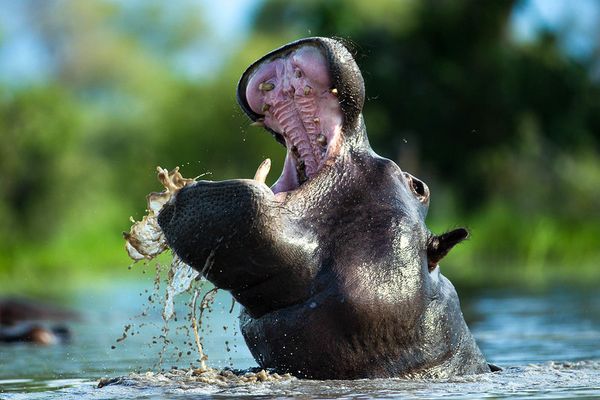Eye For Film >> Movies >> Okavango: River of Dreams (Director's Cut) (2020) Film Review
Okavango: River of Dreams (Director's Cut)
Reviewed by: Amber Wilkinson

Dante's ideas of purgatory, paradise and the inferno flow through this director's cut of Okavango: River Of Dreams, which began life as a three-part television show. There's no doubt you can still feel the join as Dereck and Beverly Joubert's beautifully shot film moves from the story of an injured lioness and her cubs, through the tale of hyenas and a warthog becoming unlikely neighbours and on to the tribulations of a family of leopards - but the episodic nature of events doesn't feel out of place in a documentary that is focused on the ever-changing nature of the river of the title.
The aim here is not to give chapter and verse on the habits of the various animals we are to meet but rather to admire them in their Botswanan habitat. Dereck Joubert, who has written the script and narrates the film, is aiming for a poetic sweep, emphasising the interconnectedness of the animals and the majesty of the Okavango itself. Sometimes this all gets laid on rather thick, but for the most part, he proves a pleasant enough guide. The camerawork from the Jouberts - and a host of others - largely aims for the similarly poetic, featuring glowing magic hour shots, some beautifully caught drone footage and impressive underwater work.

The pair describe this is as "a love letter" to the river at the start and it was most certainly a labour of love given that during the shoot they were charged by a buffalo that injured Dereck and very nearly cost Beverly her life. That love certainly comes through in the storytelling and families, in particular, are likely to enjoy the gentle sweep that, although it includes some critter deaths, does so in a way that explains that this sort of thing is necessary for the cycle of life.
There is, almost inevitably, an amount of anthropomorphisation - good for children, perhaps, but less so for adult nature fans - such as when the bush babies are said to differ from "our culture" because they pee on their hands for extra grip, or the way in which a young leopardess is described as "a composed little female" as opposed to her more curious male sibling. This gendering is also present in talk of male and female rivers, all of which seems oddly retro and redundant when you consider the likes of David Attenborough's Blue Planet.
The score, from JB Arthur and Sarah Class, also has something of an identity crisis, starting with some prog rock guitar licks (along with Marilyn Manson's enjoyably portentous version of Sweet Dreams) - a pleasant change - before spending most of the running time with more pedestrian and largely forgettable orchestera orchestration. Still, it's the river and its remarkable denizens that ultimately holds sway, with the images of scores of carmine bee-eaters, termites or the various big cats making it well worth catching on the big screen.
Reviewed on: 13 Feb 2020















